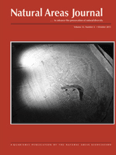
NATURAL AREAS JOURNAL
Scope & Guideline
Connecting Scholars for a Greener Tomorrow
Introduction
Aims and Scopes
- Ecological Research and Conservation:
The journal emphasizes original research on ecological systems, species conservation, and habitat management, aiming to inform strategies for preserving biodiversity. - Restoration Ecology:
A core focus is on restoration ecology methodologies, assessing the effectiveness of various restoration techniques and their impacts on ecosystems. - Community Engagement and Citizen Science:
The journal highlights the role of citizen science in conservation efforts, encouraging community involvement in ecological monitoring and data collection. - Policy and Management Strategies:
The journal addresses the intersection of ecological science and policy, discussing management strategies that can be employed at local, regional, and national levels. - Biodiversity and Ecosystem Services:
Research on the relationship between biodiversity and ecosystem services is a significant theme, exploring how natural areas contribute to human well-being.
Trending and Emerging
- Climate Change Adaptation:
A growing number of studies focus on the impacts of climate change on ecosystems, highlighting the need for adaptive management strategies to mitigate these effects. - Integrative Management Approaches:
There is an increasing trend towards integrative management practices that combine ecological, social, and economic factors to enhance conservation outcomes. - Restoration of Ecosystem Services:
Research is increasingly focusing on the restoration of ecosystem services, emphasizing the importance of biodiversity in maintaining these services for human benefit. - Use of Technology in Conservation:
The incorporation of technology, such as remote sensing and data analytics, is becoming more prevalent in studies, facilitating more effective monitoring and management of natural areas. - Community and Indigenous Knowledge:
There is a notable increase in the recognition and incorporation of community and indigenous knowledge in conservation practices, emphasizing collaborative approaches to managing natural resources.
Declining or Waning
- Traditional Species-Centric Studies:
There is a noticeable reduction in studies that focus solely on individual species without considering broader ecological contexts, indicating a shift towards more integrative approaches. - Historical Ecological Studies:
The frequency of studies that purely focus on historical ecological assessments has diminished, as the journal moves towards more contemporary issues and real-time ecological monitoring. - Invasive Species Management Focus:
While invasive species remain a topic of interest, the specific focus on management techniques for invasive species has waned in favor of broader ecological restoration discussions. - Single-Factor Environmental Impact Studies:
Research that examines the impact of a single environmental factor on ecosystems is less common, with a trend towards multi-factorial studies that consider complex interactions. - Classic Conservation Approaches:
Traditional conservation methods are being overshadowed by innovative approaches that incorporate technology, citizen science, and interdisciplinary collaboration.
Similar Journals

NORTHWEST SCIENCE
Bridging regional insights with global implications.NORTHWEST SCIENCE, published by the NORTHWEST SCIENTIFIC ASSOCIATION, serves as a vital resource for researchers and professionals in the fields of ecology, evolution, and systematics. With an ISSN of 0029-344X and an E-ISSN of 2161-9859, this journal has been disseminating valuable scientific insights since its inception in 1975 and continues to do so into 2024. Although currently positioned in the Q4 quartile for its category, it plays a crucial role in advancing the understanding of ecological and biological sciences, reflecting a diverse range of studies and methodologies. Researchers will find the journal particularly appealing due to its emphasis on regional studies and their implications on a global scale. While NORTHWEST SCIENCE is not an open-access publication, it provides significant contributions to the academic dialogue within its discipline, making it an essential addition to the library of any dedicated researcher, student, or professional in the environmental sciences.
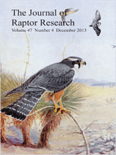
JOURNAL OF RAPTOR RESEARCH
Championing the Future of Bird ConservationJOURNAL OF RAPTOR RESEARCH, published by Raptor Research Foundation Inc, serves as a pivotal platform for disseminating research related to the biology and conservation of raptors. Established in 1990, this esteemed journal has consistently contributed to the field of Animal Science and Zoology, securing a Q2 ranking in the 2023 category quartiles on Scopus, which highlights its significant impact and relevance. With an ISSN of 0892-1016 and an E-ISSN of 2162-4569, the journal presents an extensive range of studies aimed at promoting the understanding and preservation of these majestic birds of prey. Researchers, conservationists, and students alike will find invaluable insights and peer-reviewed articles that address current conservation challenges, ecological dynamics, and the latest methodological advancements in the study of raptors. Although not open access, the journal is integral for anyone dedicated to advancing the knowledge and appreciation of avian species in ecological and conservation contexts.
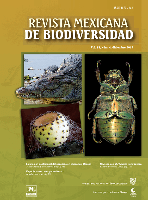
Revista Mexicana de Biodiversidad
Connecting Science and Conservation for a Thriving PlanetRevista Mexicana de Biodiversidad is a prominent academic journal dedicated to the field of biodiversity and conservation, published by the prestigious Instituto de Biología, Universidad Nacional Autónoma de México. Since its inception as an Open Access publication in 2005, it has aimed to disseminate high-quality research that advances the understanding of biological diversity in Mexico and beyond. With an ISSN of 1870-3453 and an E-ISSN of 2007-8706, the journal caters to a diverse audience, including researchers, professionals, and students, by providing vital insights into ecological studies, conservation strategies, and the sustainable management of natural resources. The journal is committed to fostering scientific collaboration and promoting the significance of biodiversity in addressing contemporary environmental challenges. By publishing innovative and impactful research, the Revista Mexicana de Biodiversidad plays an essential role in the global discourse on biodiversity conservation.

CORAL REEFS
Navigating the Future of Marine ConservationCORAL REEFS is a prestigious academic journal dedicated to advancing the understanding of coral reef ecosystems and promoting research in aquatic science. Published by SPRINGER, this journal has established itself as a leading platform in the field, with an impressive impact, ranked in the top quartile (Q1) for Aquatic Science in 2023. With its comprehensive focus, CORAL REEFS covers a wide array of topics, including ecology, conservation, and management of coral reefs, making it an essential resource for researchers, professionals, and students alike. The journal has been in continuous publication since 1982 and aims to foster collaboration and innovation among the global scientific community. Although not open access, access options are available through institutional subscriptions, enhancing the dissemination of groundbreaking research. The journal stands out for its contribution to understanding the complex dynamics of aquatic systems, solidifying its role in guiding future research and policy in marine conservation.
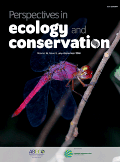
Perspectives in Ecology and Conservation
Elevating the discourse on ecology and sustainable practices.Perspectives in Ecology and Conservation, published by Elsevier Science Ltd, is a leading academic journal dedicated to advancing the fields of ecology, conservation, and environmental management. With a Q1 ranking in multiple categories, including Ecology, Management, Monitoring, Policy and Law, and Nature and Landscape Conservation, this journal boasts an impressive standing among its peers, making it essential reading for researchers and professionals. Since its inception in 2017 and running through 2024, it aims to provide innovative perspectives and critical analyses that enhance our understanding and practices in conservation science. The journal is accessible through open access options, facilitating broader dissemination of knowledge. Its commitment to addressing contemporary ecological challenges reinforces its importance in the academic community, promoting sustainable practices and informed policy-making in the face of urgent environmental issues.
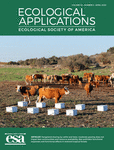
ECOLOGICAL APPLICATIONS
Unveiling the complexities of ecological systems.ECOLOGICAL APPLICATIONS, published by WILEY, is a leading journal in the field of ecology, providing a platform for innovative research that addresses the understanding and management of ecological systems. With an ISSN of 1051-0761 and E-ISSN of 1939-5582, it has established itself as a vital resource for ecologists and environmental scientists since its inception in 1991. Ranked in the top quartile (Q1) for Ecology in 2023 and with a Scopus ranking of 40 out of 461 in Environmental Science, ECOLOGICAL APPLICATIONS boasts an impressive impact factor, attesting to its significance and influence in the field. The journal's mission is to publish peer-reviewed articles that contribute to ecological theory and its applications in conservation and environmental management. Researchers, professionals, and students alike will find invaluable insights and the latest developments in ecological research through its comprehensive scope and rigorous scholarship, ensuring a crucial role in shaping future ecological practices and policies.
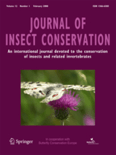
JOURNAL OF INSECT CONSERVATION
Championing the Study of Insect BiodiversityJOURNAL OF INSECT CONSERVATION, published by SPRINGER in Switzerland, is a leading peer-reviewed journal that focuses on the preservation and study of insect biodiversity and ecology. With an ISSN of 1366-638X and E-ISSN 1572-9753, this journal represents a vital resource for researchers and practitioners in the fields of Animal Science, Ecology, and Insect Science. The journal consistently ranks among the top quartiles, achieving Q1 status in Animal Science and Zoology and Q2 in other pertinent categories in 2023, according to Scopus rankings. This reflects its significant influence in the academic community, with a solid impact factor that highlights its importance in advancing the discourse on insect conservation. Though not an open access journal, it provides critical insights and innovative research findings from 1997 to 2024, making it an essential platform for those involved in the conservation of insect species and their habitats. As a scholarly resource, the JOURNAL OF INSECT CONSERVATION is dedicated to fostering knowledge dissemination and inspiring future research in pressing environmental issues.
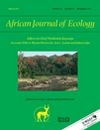
AFRICAN JOURNAL OF ECOLOGY
Unveiling the Secrets of African EcosystemsThe African Journal of Ecology, published by Wiley, is a leading academic journal in the field of Ecology, Evolution, Behavior, and Systematics. Established in 1963 and continuing its vital contributions to the field until 2024, this journal serves as a premier platform for researchers and scholars to share groundbreaking studies that explore the intricate relationships within ecosystems, particularly in the African context. With an impressive Scopus Rank of #423 out of 721 and a Q3 Quartile ranking, it stands as a credible source of scholarly information, gaining recognition among peers for its rigorous peer-review process and impactful publications. While the journal is not open access, it remains influential in driving advancements in ecological research and providing insights vital for conservation efforts and biodiversity studies. Authors and readers alike will find that the African Journal of Ecology not only promotes scientific inquiry but also fosters a deeper understanding of ecological dynamics that affect our world.
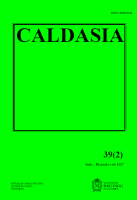
CALDASIA
Fostering Connections in the World of Biological ResearchCALDASIA is a distinguished open-access journal dedicated to the field of Agricultural and Biological Sciences, published by INST CIENCIAS NATURALES, MUSEO HISTORIA NATURAL since its inception in 1981. Based in Colombia, this journal plays a pivotal role in disseminating scientific knowledge and fostering research collaboration across the globe. With a focus on diverse subjects within the biological sciences, CALDASIA aims to bridge gaps in research and support scholars, professionals, and students in advancing their work. With a 2023 Scopus Ranking of #132 out of 221 in its category, representing a 40th percentile ranking, it holds a solid position in the academic community, particularly recognized for its contributions to miscellaneous areas within agricultural and biological sciences. The journal remains committed to enhancing accessibility, as evidenced by its open-access policy since 2001, thereby ensuring that research findings reach a wider audience without barriers. For those returning to this vibrant field, CALDASIA serves as an essential resource for contemporary findings and discussions that shape environmental and biological scholarship.

Eco mont-Journal on Protected Mountain Areas Research
Exploring the depths of ecology in protected mountain areas.Eco mont-Journal on Protected Mountain Areas Research, published by the AUSTRIAN ACAD SCIENCES PRESS, UNIV INNSBRUCK, is a pioneering open-access journal dedicated to advancing knowledge in the fields of ecology, nature conservation, and the management of protected mountain areas. Established in 2009, this journal aims to publish innovative research, policy analyses, and management strategies that contribute to the sustainable development and conservation of mountain ecosystems. With a recognition of its importance within the environmental science community, Eco mont has been progressively indexed with Scopus ranks in various categories, reflecting its growing influence in the fields of nature and landscape conservation as well as ecology. As a vital platform for researchers, professionals, and students interested in the complexities and challenges of mountain area conservation, Eco mont provides immediate and widely accessible insights crucial for informed decision-making and policy formulation in mountainous environments.